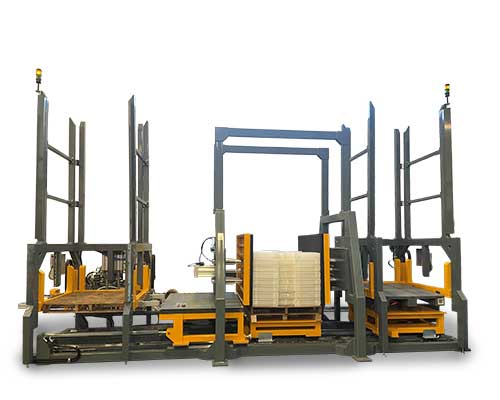The Load Transfer Station
The pallet transfer station is kind of material handling machine capable of exchanging pallets in a very safe and fast way. Discover this advanced technology here below!

Fuctions of Pallet Transfer station
If you’re looking for a customized solution to efficiently transfer loads from one pallet to another, look no further than Top Industries in Florida. As a leading international company specializing in pallet transfer systems, we can provide the perfect solution for your industry. Our advanced machines excel at:
- Transferring palletized loads between pallets
- Handling slip sheets with ease
- Efficiently transferring floor loads
In most cases, these machines are loaded from a conveyor or forklift and are designed to securely hold and transfer loads to another pallet. Load transfer stations typically consist of a metal frame, transfer plate, and receiving deck. For systems integrated within a conveyor line, there are automatic infeed and outfeed conveyors for seamless transfer.
For systems not connected to a conveyor, loading and unloading are done using a forklift.
Installation of Heineken’s Automatic Pallet Exchanger System

Features of pallet transfer station
- Loads are smoothly transferred by retracting a smooth steel plate, allowing them to be placed on various load bases such as pallets, slip sheets, or platens.
- Pallets are effectively protected using pressure-sensitive sequencing, ensuring their safe handling during transfer.
- Transfer stations are versatile and can be utilized in a wide range of applications, accommodating different pallet sizes.
- Load transfer stations provide the flexibility to choose the preferred shipping method at the dock, optimizing logistics operations.
- Loads can be conveniently placed from two sides and received from three sides, enhancing efficiency and accessibility.
- The load transfer station is compatible with both push/pull equipped trucks and standard fork trucks, allowing for seamless integration into existing workflows.
- The radio control transmitter enables convenient activation of the station from the lift truck or any fixed wall location, enhancing operational convenience.
- The mobile option facilitates easy relocation of the unit to other predetermined locations, providing versatility and adaptability.

Benefits of Pallet Transfer Stations for Food and Beverage Companies
Food and beverage companies constantly introduce new products and packaging, often sharing updates on social media. Incorporating a pallet transfer station in your operations can provide time and cost savings, streamlining your work processes. With their lower height, these stations eliminate the need for forklifts, reducing expenses.
Additionally, there’s no requirement for constructing pits, saving on building costs. The roller/chain track seamlessly integrates with pallet trucks, making it easy to integrate into your conveyor line.
Experience Reliable and Advanced Technology for Pallet Exchanging
When it comes to handling heavy loads, you need a robust and durable solution that incorporates cutting-edge technology. Our pallet exchangers offers the ideal solution to meet your requirements efficiently.
Crafted from high-quality materials, our pallet exchangers allows for seamless lifting and lowering of heavy loads at any desired height.
Experience the reliability and durability of our automatic pallet exchanger:
Which types of pallet is capable of handling?
The design can be adapted to all types of pallets including the following:
- Euro pallets
- GMA pallets
- INDU pallets
- CHEP pallets
- Düsseldorf pallets
- CP pallets
- Plastic pallets
- Presswood pallets
- Display pallets
- Perforated pallets
Why Choose a Load Transfer Station?
When it comes to optimizing your warehouse operations, it’s important to consider a load transfer station as a preferred solution. These stations offer numerous advantages over traditional pallet inverters, ensuring safer and faster operations while improving overall efficiency.
Here are the benefits of using load transfer stations:
-
Increased Lift Truck Productivity: Load transfer stations enhance the productivity of lift trucks, enabling them to handle loads more efficiently and effectively.
-
Reduced Labor Costs: By automating the load transfer process, these stations help reduce labor costs associated with manual handling and repetitive tasks.
-
Alleviated Labor Stress: Eliminating the physical demands of manual load handling reduces the strain on laborers and minimizes the risk of injuries.
-
Lower Shipping and Production Costs: Load transfer stations optimize the packaging and stacking of square and stable cargo, reducing shipping and production costs.
-
Injury Prevention: By automating load transfers, these stations eliminate the risk of injuries associated with manual handling, promoting a safer working environment.
Additionally, load transfer stations offer unique advantages for businesses:
-
Labor Reduction: By eliminating repetitive tasks and associated risks, load transfer stations minimize the need for additional labor and reduce overall labor costs.
-
Space Efficiency: Load transfer stations have a compact and portable footprint, requiring minimal space. They can be easily integrated into existing layouts without the need for extensive reconfiguration.
-
Time and Cost Savings: The modular flexibility of load transfer stations reduces the need for extensive technical resources and streamlines project timelines, resulting in significant time and cost savings.
Furthermore, using a pallet transfer station can help your company meet regulatory requirements such as FSMA (Food Safety Modernization Act), GMP (Good Manufacturing Practice), and HACCP (Hazard Analysis Critical Control Point).
In conclusion, investing in a load pallet transfer station offers numerous benefits, improving productivity, reducing costs, and ensuring compliance with industry regulations.
